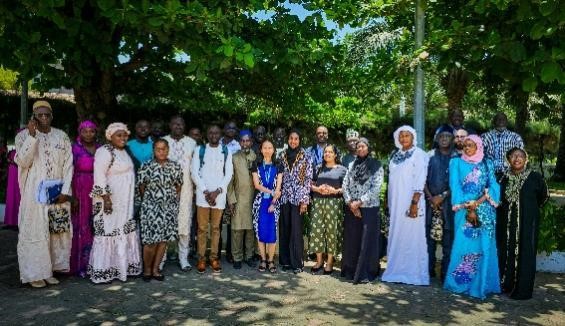By Ndey Sowe
As a demonstration of their commitment to deliver tangible results for children and adolescents in the country, UNICEF-Gambia has held its first Steering Committee meeting on their Country Program (2024 – 2028) for children, with members of the Government of The Gambia through the Ministry of Public Service.
The Steering Committee, which comprises permanent secretaries and executive directors of several Government Ministries, Departments, and Agencies, and members of the National Human Rights Commission, and Civil Society Organizations, is the overarching body in charge of providing an overall strategic oversight, guidance and direction for the implementation of the UNICEF Country Program.
The programme, which aligns with the country’s Recovery Focused National Development Plan (2023 – 2027), seeks to advance child rights in the country and ensure equitable and sustainable access to quality health, nutrition, water and sanitation, education, child protection, and social policy. The Committee will support the operationalisation of the current and future Country Programs for children and provide overall guidance to the Technical Committee (TC), which held the Country Program’s 2024 annual review on 15 January 2025.
Speaking at the meeting, Mr. Pateh Jah, Permanent Secretary at the Ministry of Public Service who represented the Deputy Chief of Staff and Head of Department for Strategic Policy and Delivery (DSPD), highlighted the important role UNICEF plays in supporting the implementation of the country’s National Development Plan’s (NDP) priorities, and harped on the crucial role that the Steering Committee will play in achieving the goals of the Country Programme (2024 – 2028) for children.
“The Steering Committee provides strategic decisions and orientations for the development, implementation, monitoring and evaluation of the Country Program by ensuring full alignment with the country’s NDP, to achieve impactful results for the population of The Gambia especially vulnerable children and adolescents. The Steering Committee is supported by a Technical Committee, which provides technical oversight expertise to the implementation of the Country Programme and the Coordination Task Force as the secretariat,” Mr. Jah said.
In her statement, Ms. Nafisa Binte Shafique, the UNICEF Country Representative in The Gambia, expressed appreciation for the creation of the Steering Committee and thanked the Government of The Gambia for their unwavering support and dedication in championing child rights in the country. This includes the establishment of a comprehensive oversight mechanism for the current Country Program (2024 – 2028) and future programs for children through the Steering and Technical Committees.
“UNICEF’s mandate is centered on ensuring that every child, everywhere, can survive, grow, thrive and fulfill their potentials as enshrined in the United Nations Convention on the Rights of the Child. Achieving this ambitious goal requires not only the dedication of key stakeholders, including government, non-governmental partners, the private sector, and children, but also having responsive systems, tools, and resources to translate our collective vision into tangible outcomes for children and adolescents. The existence of a strong and inclusive oversight mechanism is therefore critical to ensure the effectiveness, efficiency, and responsiveness of our Country Program,” Ms. Shafique asserted.
The Steering Committee (SC) is co-chaired by Government’s Deputy Chief of Staff and Head of DSPD and UNICEF-The Gambia Representative.
UNICEF-The Gambia’s vision for 2024 – 2028 is to see an accelerated and holistic progress in the attainment of every right for every child and will apply a life-cycle approach to ensure that every child is able to survive, thrive, learn, be protected and be free from poverty. This approach by UNICEF is grounded in the UN Convention on the Rights of the Child and is fully aligned with The Gambia’s National Development Plan.


















